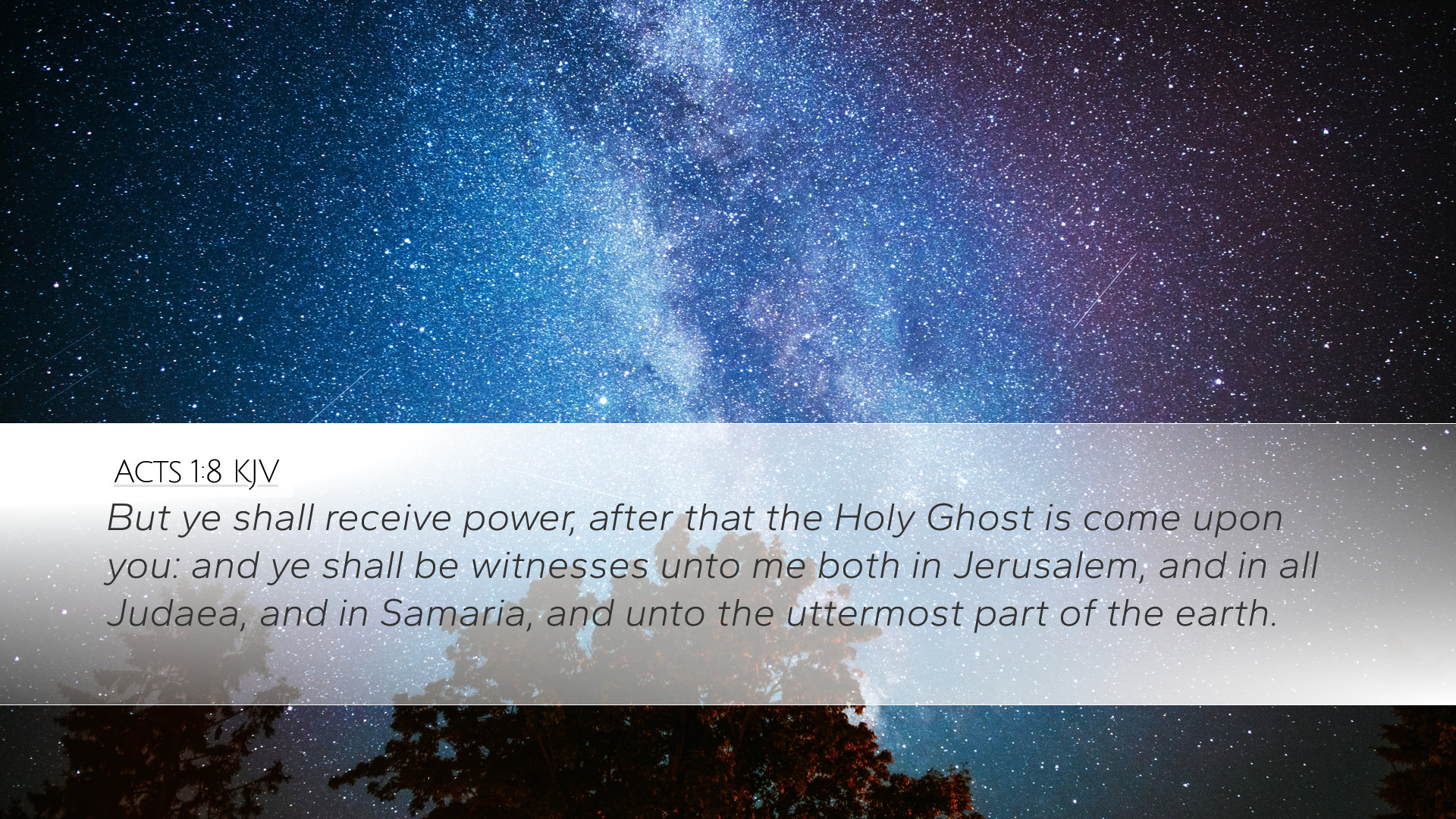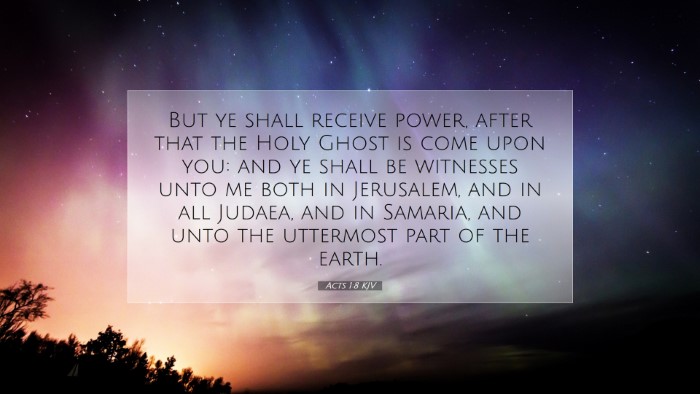Old Testament
Genesis Exodus Leviticus Numbers Deuteronomy Joshua Judges Ruth 1 Samuel 2 Samuel 1 Kings 2 Kings 1 Chronicles 2 Chronicles Ezra Nehemiah Esther Job Psalms Proverbs Ecclesiastes Song of Solomon Isaiah Jeremiah Lamentations Ezekiel Daniel Hosea Joel Amos Obadiah Jonah Micah Nahum Habakkuk Zephaniah Haggai Zechariah MalachiActs 1:8
Acts 1:8 KJV
But ye shall receive power, after that the Holy Ghost is come upon you: and ye shall be witnesses unto me both in Jerusalem, and in all Judaea, and in Samaria, and unto the uttermost part of the earth.
Acts 1:8 Bible Commentary
Commentary on Acts 1:8
Verse: Acts 1:8 - "But ye shall receive power, after that the Holy Ghost is come upon you: and ye shall be witnesses unto me both in Jerusalem, and in all Judaea, and in Samaria, and unto the uttermost part of the earth."
Introduction
The book of Acts, written by Luke, serves as a bridge between the Gospel of Jesus Christ and the history of the early Church. Acts 1:8 stands as a pivotal verse that outlines the mission of the Church and highlights the empowerment provided by the Holy Spirit. This verse encapsulates the essence of the Christian witness and the role of the believer in the expansion of the Gospel.
Analysis of the Text
-
Empowerment by the Holy Spirit
Matthew Henry notes that the promise of receiving power is central to the believer's ability to witness effectively. This power is not merely natural strength or ability, but a divine empowerment that comes from the Holy Spirit. Clarke emphasizes that this endowment is crucial for undertaking the daunting task of evangelism, which requires divine assistance.
-
The Witnesses of Christ
Barnes observes that the term "witnesses" signifies not only those who attest to what they have seen and heard but also those who are ready to testify about the resurrection of Christ. This obligation to bear witness remains relevant to all believers today, as they are called to reflect the life and teachings of Jesus in their communities.
-
The Scope of the Mission
The geographical progression from Jerusalem to the "uttermost part of the earth" indicates an expanding mission. Henry points out that this reflects the universal nature of the Gospel; it is intended for all nations. Clarke elaborates on this by asserting that the inclusion of Samaria and the Gentiles marks a significant turn in God’s redemptive plan, welcoming all people into the fold.
Theological Implications
-
The Nature of Christ’s Commission
This verse encapsulates the Great Commission found in Matthew 28:18-20. As commented by Barnes, it is a clear directive from Christ that believers are not to keep the Gospel to themselves but are called to share it publicly and boldly.
-
The Role of the Holy Spirit
Henry posits that the coming of the Holy Spirit is both a fulfillment of Old Testament prophecy and a necessary preparation for evangelistic work. This reflects the belief that without the Holy Spirit, spiritual endeavors would be ineffective. Clarke adds that the Holy Spirit’s empowerment is crucial in providing wisdom, guidance, and boldness in the face of opposition.
-
The Universal Call
The mention of various geographic locations emphasizes the inclusive mission of the Church. This aligns with the prophetic writings of Isaiah and others regarding the inclusion of the Gentiles. Barnes underscores the importance of this aspect in understanding the Church's mission throughout history, pointing to the diverse body of believers that comprises the Church today.
Application for Today
-
Empowerment for Service
For pastors and church leaders, Acts 1:8 serves as a vital reminder of the need for reliance on the Holy Spirit in ministry. Henry emphasizes that success in the Christian life and ministry stems from a dependence on divine power rather than human effort.
-
Commitment to Witnessing
The call to be witnesses extends beyond the initial disciples and is applicable to all believers. Clarke urges Christians to embrace their role as witnesses in their everyday lives, sharing the love and truth of Christ with those around them effectively.
-
Global Evangelism
In discussing the "uttermost parts of the earth," Barnes highlights the modern Church's call to participate in global missions. This goes beyond local outreach and encourages engagement with diverse cultures, reflecting a commitment to fulfilling Christ's command.
Conclusion
Acts 1:8 is a foundational text that inspires believers to seek the power of the Holy Spirit for effective witness. The insights from Matthew Henry, Albert Barnes, and Adam Clarke provide a rich theological framework for understanding the imperative of evangelism and the role of the Church in the active spread of the Gospel. As believers engage in this divine mission, they find their lives transformed and empowered for service, demonstrating the compelling nature of the Christian journey.


